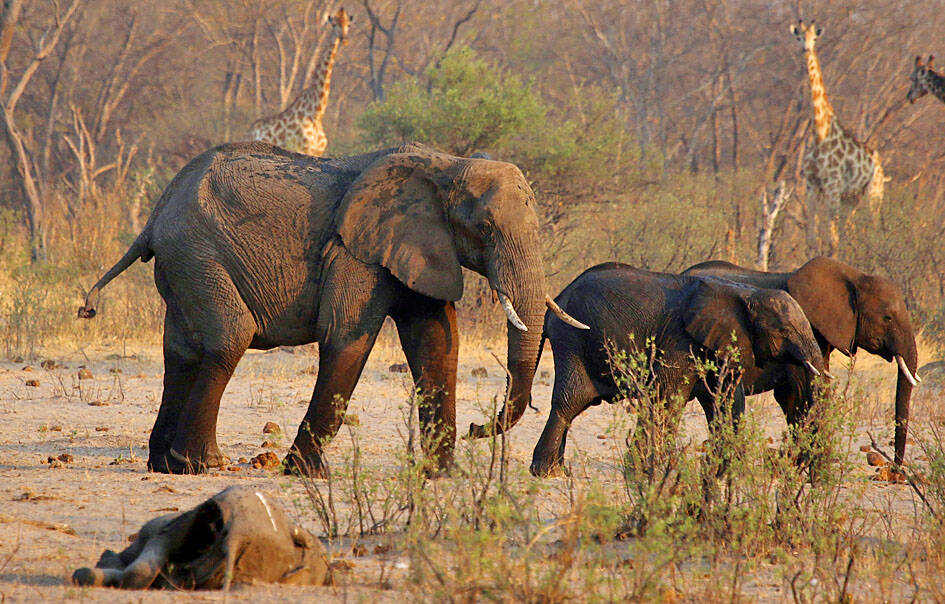Zimbabwe would cull 200 elephants as it faces an unprecedented drought that has led to food shortages, a move that would also allow it to tackle a ballooning population of the animals, the country’s wildlife authority said on Friday.
The country has “more elephants than it needed,” Zimbabwean Ministry of Environment, Climate and Wildlife said in the Zimbabwean parliament on Wednesday, adding that the government had instructed the Zimbabwe Parks and Wildlife Authority (ZimParks) to begin the culling process.
The 200 elephants would be hunted in areas where they have clashed with humans, including Hwange, home of Zimbabwe’s largest natural reserve, ZimParks director-general Fulton Mangwanya said.

Photo: Reuters
Zimbabwe is home to an estimated 100,000 elephants and has the second-biggest elephant population in the world after Botswana.
Thanks to conservation efforts, Hwange is home to 65,000 of the animals, more than four times its capacity, ZimParks said.
Zimbabwe last culled elephants in 1988.
Neighboring Namibia this month said that it had already killed 160 wildlife in a planned cull of more than 700 animals, including 83 elephants, to cope with its worst drought in decades.
Zimbabwe and Namibia are among a swathe of countries in southern Africa that have declared a state of emergency because of drought.
About 42 percent of Zimbabweans live in poverty, according to UN estimates, and authorities say about 6 million would require food assistance during the November to March lean season, when food is scarcest.
The move to hunt the elephants for food was criticized by some, not least because the animals are a major draw for tourists.
“Government must have more sustainable eco-friendly methods to dealing with drought without affecting tourism,” Center for Natural Resource Governance director Farai Maguwu said.
“They risk turning away tourists on ethical grounds. The elephants are more profitable alive than dead,” he said. “We have shown that we are poor custodians of natural resources and our appetite for ill-gotten wealth knows no bounds, so this must be stopped because it is unethical.”
However, Chris Brown, a conservationist and CEO of the Namibian Chamber of Environment, said that “elephants have a devastating effect on habitat if they are allowed to increase continually, exponentially.”
“They really damage ecosystems and habitats, and they have a huge impact on other species which are less iconic and therefore matter less in the eyes of the Euro-centric, urban armchair conservation people,” he said. “Those species matter as much as elephants.”
Namibia’s cull of elephants has been condemned by conservationists and the animal rights group PETA as short-sighted, cruel and ineffective.
However, the Namibian government said the 83 to be culled would be only a small fraction of the estimated 20,000 elephants in the arid country and would relieve pressure on grazing and water supplies.

Kehinde Sanni spends his days smoothing out dents and repainting scratched bumpers in a modest autobody shop in Lagos. He has never left Nigeria, yet he speaks glowingly of Burkina Faso military leader Ibrahim Traore. “Nigeria needs someone like Ibrahim Traore of Burkina Faso. He is doing well for his country,” Sanni said. His admiration is shaped by a steady stream of viral videos, memes and social media posts — many misleading or outright false — portraying Traore as a fearless reformer who defied Western powers and reclaimed his country’s dignity. The Burkinabe strongman swept into power following a coup in September 2022

‘FRAGMENTING’: British politics have for a long time been dominated by the Labor Party and the Tories, but polls suggest that Reform now poses a significant challenge Hard-right upstarts Reform UK snatched a parliamentary seat from British Prime Minister Keir Starmer’s Labor Party yesterday in local elections that dealt a blow to the UK’s two establishment parties. Reform, led by anti-immigrant firebrand Nigel Farage, won the by-election in Runcorn and Helsby in northwest England by just six votes, as it picked up gains in other localities, including one mayoralty. The group’s strong showing continues momentum it built up at last year’s general election and appears to confirm a trend that the UK is entering an era of multi-party politics. “For the movement, for the party it’s a very, very big

A new online voting system aimed at boosting turnout among the Philippines’ millions of overseas workers ahead of Monday’s mid-term elections has been marked by confusion and fears of disenfranchisement. Thousands of overseas Filipino workers have already cast their ballots in the race dominated by a bitter feud between President Ferdinand Marcos Jr and his impeached vice president, Sara Duterte. While official turnout figures are not yet publicly available, data from the Philippine Commission on Elections (COMELEC) showed that at least 134,000 of the 1.22 million registered overseas voters have signed up for the new online system, which opened on April 13. However,

ENTERTAINMENT: Rio officials have a history of organizing massive concerts on Copacabana Beach, with Madonna’s show drawing about 1.6 million fans last year Lady Gaga on Saturday night gave a free concert in front of 2 million fans who poured onto Copacabana Beach in Rio de Janeiro for the biggest show of her career. “Tonight, we’re making history... Thank you for making history with me,” Lady Gaga told a screaming crowd. The Mother Monster, as she is known, started the show at about 10:10pm local time with her 2011 song Bloody Mary. Cries of joy rose from the tightly packed fans who sang and danced shoulder-to-shoulder on the vast stretch of sand. Concert organizers said 2.1 million people attended the show. Lady Gaga